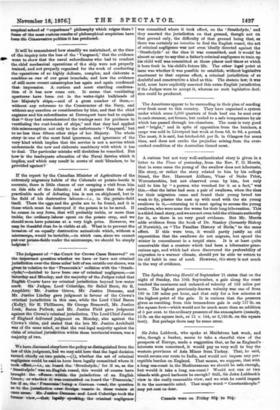We have discussed elsewhere the policy as distinguished from the
law of this judgment, bat we may add here that the legal decision turned chiefly on two points,—(1), whether the act of criminal negligence could be said to have been legally committed where it took effect,—i.e., on board the Strathclyde,' for if so, as the 'Strathclyde' was an-Englisk vessel, this would of' course have brought the offence- within the jurisdiction of an English Court; or whether it waccommitted on board the 'Franconia,' for if so, the Franconia.' being a German vessel, the question as to the jurisdiction come- foreign vessels in these waters at once arose. Mr. Judaea'Denman' and Lord Coleridge took the former view,—that, legally/ speaking, the criminal negligence was committed where it took effect, on the 'Strathclyde,' and they asserted the jurisdiction on that ground, though not on that ground only, the difficulty of that ground being that, as there was certainly no intention to foul the English vessel, the act of criminal negligence was not even ideally directed against the 'Strathclyde' at the time it was committed, and it would be almost as easy to my that a father's criminal negligence to train up his child well was- committed at those places and times at which it bore fruit in his child's future life. The other legal, point at issue was whether it was possible to establish, without legislative enactment to that express effect, a criminal jurisdiction of so doubtful and constructive a kind as this. The statute law, it was held, must have explicitly asserted this extra-English jurisdiction if the Judges were to accept it, whereas no such legislative deci- sion could be produced.






































 Previous page
Previous page